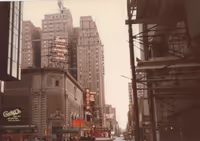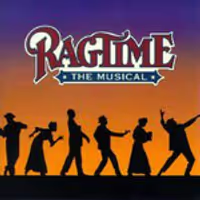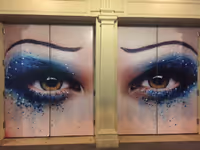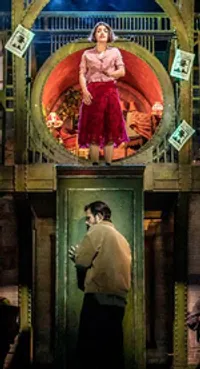An Oversaturated Spring? Data and opinions...
#1An Oversaturated Spring? Data and opinions...
Posted: 1/25/24 at 7:24am
First Adam Feldman writes "Too many shows get jammed into April, and we've got the data to prove it."
https://www.timeout.com/newyork/news/let-me-tell-youbroadway-in-april-is-too-damn-crowded-012424
BTTF's Casey Likes seemed to agree, noting:


#2An Oversaturated Spring? Data and opinions...
Posted: 1/25/24 at 7:53am
Does there need to be some kind of centralised governance on the programming of Broadway and opening schedules for the greater good? Realise in practice it’ll be a nightmare and highly political.
#3An Oversaturated Spring? Data and opinions...
Posted: 1/25/24 at 7:59am
It’s not the spring overall but rather the month of April that’s overstuffed- as Feldman points out, 11 shows are opening in a span of 9 days, which is just insane.
#4An Oversaturated Spring? Data and opinions...
Posted: 1/25/24 at 8:06am
Under saturated audience? How does he know how many people want to go to the theatre. The people interested in seeing Hells Kitchen is generally going to be a different audience than those interested in seeing The Who’s Tommy. I suspect for some of those people, it will be their first Broadway show. This is about finding your audience and selling your show to those who are interested. Not a zero sum game like people are making it out to be.
#5An Oversaturated Spring? Data and opinions...
Posted: 1/25/24 at 8:14am
It’s also effectively blaming the landlords. It’s not their fault people don’t know how to put on a good show.
pablitonizer
Leading Actor Joined: 4/8/21
#6An Oversaturated Spring? Data and opinions...
Posted: 1/25/24 at 8:19am
I don't think the problem is an oversaturated spring. Each new show needs to find their audience as it's always been, right? That's always been the rule on Broadway. However, I do see a few titles from the list of shows opening this spring that have the word 'flop' all over. But that's not related to the oversaturated season, I simply think they won't ever work no matter the season or the amount of competition.
I think the problem on Broadway are the costs, that deserves a deep and detailed discussion imo
#7An Oversaturated Spring? Data and opinions...
Posted: 1/25/24 at 9:07am
Broadway Flash said: "It’s also effectively blaming the landlords. It’s not their fault people don’t know how to put on a good show."
It’s not blaming the landlords, nor does it have anything to do with people knowing how to put on a good show. It is a producing decision to push production openings as close to the Tony cutoff as possible.
#8An Oversaturated Spring? Data and opinions...
Posted: 1/25/24 at 10:01am
My comment was in response to the guy from back to the future who said the market was over saturated and that it’s irresponsible.
#9An Oversaturated Spring? Data and opinions...
Posted: 1/25/24 at 10:51am
Everyone wants to be featured on the Tonys and get some good press. Makes a lot of sense. No guarantee you can open in Sept and still be running by June.
#10An Oversaturated Spring? Data and opinions...
Posted: 1/25/24 at 11:32am
binau said: "Does there need to be some kind of centralised governance on the programming of Broadway and opening schedules for the greater good? Realise in practice it’ll be a nightmare and highly political."
The landlords at various points over the years have tried to help the April glut of shows by having shows close by the first Sunday in January (not doable for every show). Let's say the earliest a new show can start is 6 weeks past that (give or take), which puts you at mid-February previews –– not the best time of year to build WOM. And then sometimes hands are tied by artist scheduling.
This year is no worse than past years but it still causes some of those late-April shows to get memory-holed by people (press, voters) seeing shows 4-6 nights a week.
We also must remember that the time of year wouldn't matter a bit for some shows: they would fail whether they opened in January or April or September. (Ohio, Grey House, Once Upon, Shark, etc). A really good show with a sustainable audience base will rise up from the crowd. Heart of Rock & Roll is going to be hurt even more by opening smack dab in the middle of some of the most hotly anticipated works of the spring *and* on the same night as Patriots. Spamalot's numbers have been pretty decent, and it helps that it's the only musical comedy in town with something of name value; it might sputter out by springtime, but for now it looks ok.
#11An Oversaturated Spring? Data and opinions...
Posted: 1/25/24 at 11:34am
It is well to remember that producers are inflicting this on themselves, and they are the stakeholders. Why some of them can't find an earlier Spring slot in which they would have more breathing room is bizarre, but in the end this is their calculus and their call. There is no question that there are a ton of issues driving scheduling that no one here is likely to fully appreciate, but there are plenty of examples of producers (individually and collectively) who seem pretty clueless about how to market their show, i.e., nurture their audience. But the answer is definitely not "centralised (or -ized) governance." Although I suspect the employer of Casey Likes would like some way to govern the editing capability of what comes out of its employees' mouths and keyboards.
chrishuyen
Broadway Legend Joined: 11/12/14
#12An Oversaturated Spring? Data and opinions...
Posted: 1/25/24 at 11:43am
General knowledge was that people wanted to open as close to the Tony cutoff as possible because it would give them the best chances at the Tony, but Adam Feldman mentions that in the past 20 years over half of the Best Musical winners did not open in the spring, so I wonder if it's just a paradigm shift that needs to happen? To be fair, if your show closes before January, I do think your chances at winning Tonys becomes a lot slimmer, so it's about playing the game to remain open until the Tonys, which would be harder it you open earlier, but then it also becomes about creating a show people want to see, marketing it to those people, and keeping finances under control so that you can still run through some leaner months (all of which, in my view as an outsider, you should be doing anyway).
I don't really think there should be an authority to oversee this, because I don't see it as an inherently bad thing, but it does seem to be good food for thought for producers.
#13An Oversaturated Spring? Data and opinions...
Posted: 1/25/24 at 12:28pm
Broadway Flash said: "Under saturated audience? How does he know how many people want to go to the theatre. The people interested in seeing Hells Kitchen is generally going to be a different audience than those interested in seeing The Who’s Tommy. I suspect for some of those people, it will be their first Broadway show. This is about finding your audience and selling your show to those who are interested. Not a zero sum game like people are making it out to be."
Not sure I agree with your thesis about a different audience for Hells Kitchen vs The Who's Tommy. I am a huuuuuge music buff - of almost all kinds - and sought out both shows specifically because BOTH steam from two artists that I really enjoy. Suspect there is a subset of us folks that are music peeps and theater lovers who dove fully into both shows.
But agree entirely that the amount of shows opening in April is not good for this business in general.
#14An Oversaturated Spring? Data and opinions...
Posted: 1/25/24 at 12:35pm
Interesting article - I would also add that so many shows opening at once do make audiences have to pick and choose more, depending on the amount of spending money they have. With a whole bunch of shows opening at one time, even if I'd like to go and see the majority of them, with ticket prices as they are, it's impossible for me to financially attend all that I wish to in such a close time frame to each other.
If openings were more staggered throughout the year, my budget would definitely allow me to attend more without having to pick my top priorities (and therefore often missing shows before they close).
#15An Oversaturated Spring? Data and opinions...
Posted: 1/25/24 at 1:03pm
GilmoreGirlO2 said: "Interesting article - I would also add that so many shows opening at once do make audiences have to pick and choose more, depending on the amount of spending money they have. With a whole bunch of shows opening at one time, even if I'd like to go and see the majority of them, with ticket prices as they are, it's impossible for me to financially attend all that I wish to in such a close time frame to each other."
This is spot on. People's budgets are still tight and reality is that a lot of folks (myself included) don't have the funds to see up to half a dozen shows when they visit NYC - even with discounts. Unfortunately that means being very picky, which is trouble for the shows that don't have the brand recognition and / or the star power to move tickets.
For these shows, I can understand the reasoning behind wanting to open closer to the Tonys so as to use any nominations and wins as marketing ammunition to help cut through the clutter. But even then, it's still sometimes an uphill battle to convince prospective audience members to take a chance when there's so much competition for people's limited dollars.
saxpower
Featured Actor Joined: 9/14/16
#16An Oversaturated Spring? Data and opinions...
Posted: 1/25/24 at 1:38pm
There's an upper limit to how many shows people can or will see in a short period. There's only so much "oxygen" to go around and with this many shows either all of them get a small amount or someone is left without. It may not be possible for multiple shows to get good box offices all at the same time, which also affects word of mouth and Tony-related "momentum". There just may not be enough "butts in seats" to sustain this many shows. The other and related possibility is some shows get "lost in the shuffle". From what I understand of "The Notebook" and "Like Water For Elephants", the plots are somewhat similar with similar themes. Will both be able to compete with each other? We will see. I just don't want to see shows which would be hits any season end up closing. There's no guarantee it will be the quality shows that survive.
pmensky
Broadway Star Joined: 7/18/11
#17An Oversaturated Spring? Data and opinions...
Posted: 1/25/24 at 2:25pm
Upcoming openings. What am I missing?:
Days of Wine and Roses - January 28
Doubt - February 29
My Son’s a Queer - March 12
The Notebook - March 14
An Enemy of the People - March 18
Water for Elephants - March 21
The Who’s Tommy - March 28
The Outsiders - April 11
Lempicka - April 14
The Wiz - April 17
Suffs - April 18
Stereophonic - April 19
Hell’s Kitchen - April 20
Cabaret - April 21
The Heart of Rock n Roll - April 22
Patriots - April 22
Mary Jane - April 23
Uncle Vanya - April 24
The Great Gatsby - April 25
Mother Play - April 25
#18An Oversaturated Spring? Data and opinions...
Posted: 1/25/24 at 2:34pm
I don't know if you're missing any, but these are always my go-to resources:
Broadway League Opening Night Calendar
Off-Broadway League Opening Night Calendar
Broadway Now & Next
pmensky
Broadway Star Joined: 7/18/11
#19An Oversaturated Spring? Data and opinions...
Posted: 1/25/24 at 2:36pm
ErmengardeStopSniveling said: "I don't know if you're missing any, but these are always my go-to resources:
Broadway League Opening Night Calendar
Off-Broadway League Opening Night Calendar
Broadway Now & Next"
Oh, thanks. Those are great resources.
#20An Oversaturated Spring? Data and opinions...
Posted: 1/25/24 at 2:39pm
pmensky said: "Upcoming openings. What am I missing?:
Days of Wine and Roses - January 28
Doubt - February 29
My Son’s a Queer - March 12
The Notebook - March 14
An Enemy of the People - March 18
Water for Elephants - March 21
The Who’s Tommy - March 28
The Outsiders - April 11
Lempicka - April 14
The Wiz - April 17
Suffs - April 18
Stereophonic - April 19
Hell’s Kitchen - April 20
Cabaret -April 21
The Heart of Rock n Roll - April 22
Patriots - April 22
Mary Jane - April 23
Uncle Vanya - April 24
The Great Gatsby - April 25
Mother Play - April 25"
Alan Cumming Is Not Acting His Age is March 11, if you want to count that.
#21An Oversaturated Spring? Data and opinions...
Posted: 1/25/24 at 2:52pm
If you’re looking for a theater front of house job there might be openings.
#22An Oversaturated Spring? Data and opinions...
Posted: 1/25/24 at 3:32pm
Do the people who decide if and when to take a show to Broadway (the main producers, I assume) always care that much if the show lasts for a long time there? I'm sure everyone involved in a show (not least the investors) would like that to be the case, and many involved may even believe that that's the main aim. But are the key decision-makers sometimes taking a show to Broadway with an eye to garnering attention and enabling future marketing of the show as a 'Broadway' show, with future plans for licensing and tours etc? Does a short Broadway run sometimes intentionally serve as a sort of loss leader for the long-term life and reputation of a show?
Islander_fan
Broadway Legend Joined: 6/25/14
#23An Oversaturated Spring? Data and opinions...
Posted: 1/25/24 at 4:28pm
Fan123 said: "Do the people who decide if and when to take a show to Broadway (the main producers, I assume) always care that much if the show lasts for a long time there? I'm sure everyone involved in a show (not least the investors) would like that to be the case, and many involved may even believe that that's the main aim. But are the key decision-makers sometimes taking a show to Broadway with an eye to garnering attention and enabling future marketing of the show as a 'Broadway' show, with future plans for licensing and tours etc? Does a short Broadway run sometimes intentionally serve as a sort of loss leader for the long-term life and reputation of a show?"
Yes, a show that was on Broadway, regardless of how long, can usually make more in the amateur licensing market than a show that wasn’t. A good recent example of this is Newsies. They initially planned to just do it at paper mill and then sell the rights to amateur groups. But, because of its good sales there and the knowledge that it would give them more money on the licensing circuit they bought it to Broadway under a limited run. But, seeing as Disney has a money fetish the show was an open run do to successful sales on Broadway.
#24An Oversaturated Spring? Data and opinions...
Posted: 1/25/24 at 5:26pm
Fan123 said: "Do the people who decide if and when to take a show to Broadway (the main producers, I assume) always care that much if the show lasts for a long time there? I'm sure everyone involved in a show (not least the investors) would like that to be the case, and many involved may even believe that that's the main aim. But are the key decision-makers sometimes taking a show to Broadway with an eye to garnering attention and enabling future marketing of the show as a 'Broadway' show, with future plans for licensing and tours etc? Does a short Broadway run sometimes intentionally serve as a sort of loss leader for the long-term life and reputation of a show?"
Broadway is too expensive to be viewed as a loss-leader by sane lead producers. Not when most of these shows are costing $18-$25 million. Everyone's hope at the start is that a show can be a success on Broadway, and then ALSO be a success on the road, in London, with regional licensing, etc.
Keep in mind also that licensing is pennies on the dollar for investors. It starts as 60/40 split for the authors & producers, then with time becomes more in the author's favor, until after about 18 years the producer gets nothing and the author gets all. (In most cases.) That can work out well for the authors, but it's a sloooow process if something like Be More Chill or Dance in Ohio producers expect to see any profit.
#25An Oversaturated Spring? Data and opinions...
Posted: 1/25/24 at 6:01pm
Here lies love probably wishes they opened in the spring. And these theatres are always full in the spring. The complaint of there being too many shows on Broadway, they could have said the same thing 10 years ago. If there were only 15 shows on Broadway, that doesn’t mean they will sell because there’s less competition.
Videos











